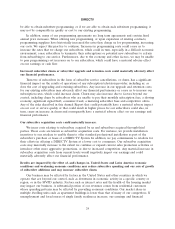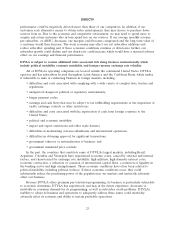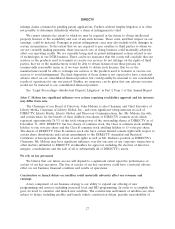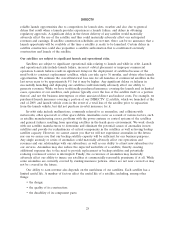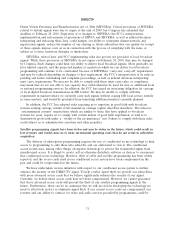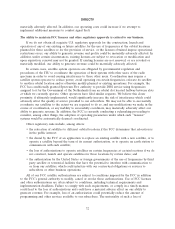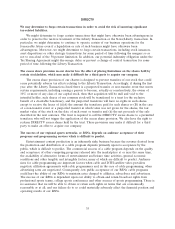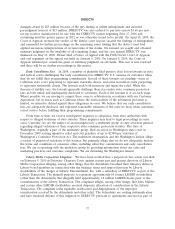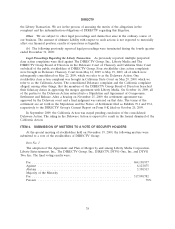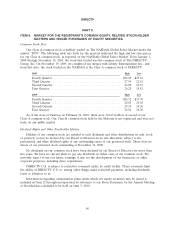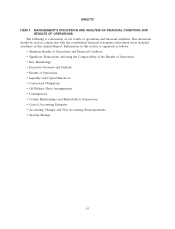DIRECTV 2009 Annual Report Download - page 45
Download and view the complete annual report
Please find page 45 of the 2009 DIRECTV annual report below. You can navigate through the pages in the report by either clicking on the pages listed below, or by using the keyword search tool below to find specific information within the annual report.DIRECTV
authorization would vary based upon, among other things, the orbital location at which the frequencies
may be used.
In addition, in connection with its approval of Liberty Media’s acquisition of News Corporation’s
interest in DIRECTV in 2007, the FCC required the parties to the transaction to sever all attributable
links between DTVPR and Liberty Cablevision Puerto Rico, Ltd. (a subsidiary of Liberty Global, Inc.
in which John Malone holds an interest). After attempts to sell DTVPR were unsuccessful, DIRECTV
placed its entire interest in DTVPR into a trust, and it is currently operated by an independent trustee
pending divestiture. DIRECTV believes that this trust effectively renders its interest in DTVPR
non-attributable, consistent with past FCC precedent, and thus satisfies the FCC condition. However,
the FCC has not ruled on the efficacy of the trust, and may take a different view. If so, we may have to
find an alternative method for severing the attributable links between the two companies, which could
adversely effect our financial performance.
Moreover, some of our authorizations and future applications may be subject to petitions and
oppositions, and there can be no assurance that our authorizations will not be canceled, revoked or
modified or that our applications will not be denied. Moreover, the FCC has adopted new rules for
licensing satellites that may limit our ability to file applications and secure licenses in the future.
Congress has continued to shape the scope of the FCC’s regulatory authority and enact legislation
that affects our business. In addition, FCC proceedings to implement legislation and enact additional
regulations are ongoing. The outcomes of these legislative or regulatory proceedings or their effect on
our business cannot be predicted.
We control a substantial portion of interaction with our customers and we may not be as efficient or
effective as our outsourced providers resulting in higher costs.
We have a number of insourced call centers and installation service providers to handle customer
service calls, installations and repairs. We may not be as efficient or effective as our outsourced
providers resulting in higher costs. Also, there is a risk that our customer satisfaction could be
impacted, which may lead to higher subscriber churn and an inability to attract new subscribers. In
addition, our outsourced providers could encounter financial difficulties, which may disrupt our ability
to make installation service calls or to provide a level of customer service we expect, and which also
may lead to higher subscriber churn and an inability to attract new subscribers.
We have significant debt.
We have debt totaling $8.0 billion as of December 31, 2009. If we do not have sufficient income or
other sources of cash, it could affect our ability to service debt and pay other obligations.
As a result of completing the merger transactions, we assumed, on a consolidated basis,
approximately $1.9 billion of indebtedness to Bank of America and also assumed rights and obligations
connected with the related equity collars. We requested that Bank of America settle the equity collars
prior to their expiration, pursuant to agreed upon market practices. In February 2010, we completed
the settlement of the equity collars and repaid the indebtedness.
We face risks arising from possible union legislation in the United States.
There is a possibility that the proposed Employee Free Choice Act, or EFCA, may be enacted.
The EFCA, also referred to as the ‘‘card check’’ bill, if passed in its current form could significantly
change the nature of labor relations in the United States, specifically, how union elections and contract
negotiations are conducted. With respect to our owned and operated home service provider installation
33



